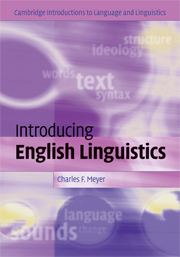Book contents
- Frontmatter
- Contents
- Preface
- 1 The study of language
- 2 The development of English
- 3 The social context of English
- 4 The structure of English texts
- 5 English syntax
- 6 English words: Structure and meaning
- 7 The sounds of English
- Appendix: Linguistic corpora consulted
- Glossary
- Answers to self-study activities
- References
- Index
Answers to self-study activities
Published online by Cambridge University Press: 05 June 2012
- Frontmatter
- Contents
- Preface
- 1 The study of language
- 2 The development of English
- 3 The social context of English
- 4 The structure of English texts
- 5 English syntax
- 6 English words: Structure and meaning
- 7 The sounds of English
- Appendix: Linguistic corpora consulted
- Glossary
- Answers to self-study activities
- References
- Index
Summary
The study of language
1b, 2c, 3d, 4a
All languages have rules that specify how constructions are formed, and principles that govern how these constructions are actually used. Rules are tied to competence: the abstract underlying knowledge of a language that any speaker will possess. Principles are tied to performance: how we use the structures that rules create. Thus, if you are studying rules of syntax, you are studying linguistic competence: our knowledge of how we put words together to form phrases and clauses, not our knowledge of how we use these structures once they've been formed.
In general, linguists prefer descriptive rather than prescriptive approaches to language study. A descriptivist simply describes language structure, laying out the facts about Language X or Language Y in objective and scientific terms. A prescriptivist, on the other hand, is more interested in telling people how to use language, often times in very subjective and emotional language (e.g. double negatives are illogical and reflect sloppy thinking).
[…]
- Type
- Chapter
- Information
- Introducing English Linguistics , pp. 239 - 246Publisher: Cambridge University PressPrint publication year: 2009



